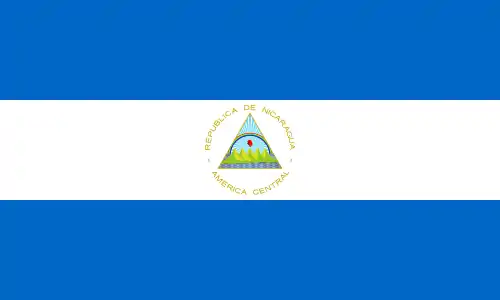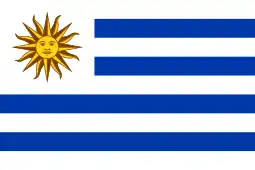Episcopal Conference of Latin America
The Latin American Episcopal Council (Spanish: Consejo Episcopal Latinoamericano; Portuguese: Conselho Episcopal Latino-Americano), better known as CELAM, is a council of the Roman Catholic bishops of Latin America, created in 1955 in Rio de Janeiro, Brazil.
Based in Bogotá (Colombia), CELAM pushed the Second Vatican Council (1962–65) toward a more progressive stance. During the four next years, CELAM prepared 1968 Medellín Conference, in Colombia, officially supporting "base ecclesiastic communities" and the liberation theology propounded by Gustavo Gutiérrez in his 1972 essay, A Theology of Liberation: History, Politics and Salvation. In 1968, Bishop Samuel Ruiz of Chiapas, Mexico, was named president of the Department of Missions of CELAM.
Conflict over liberation theology
CELAM support for liberation theology was frowned on by the Vatican and Pope Paul VI, who tried to slow the movement after the 1962-1965 Council. Cardinal Antonio Samoré, in charge of relations between the Roman Curia and the CELAM as the leader of the Pontifical Commission for Latin America, was ordered to put a term to this orientation.
With Alfonso López Trujillo's election in 1972 as general secretary of CELAM, conservatives gained control of this organization, at much the same time as they were beginning to regain control of the Roman Curia. Considered a papabile at the 2005 Papal conclave, López Trujillo stayed CELAM's general secretary until 1984. However, at the 1979 CELAM Conference of Puebla, over three months after the election of Karol Wojtyla as Pope John Paul II conservative reorientation of the CELAM was met by strong opposition from the progressive part of the clergy, which defined the concept of a "preferential option for the poor". However, Pope John Paul II would go on to use the phrase in his 1987 encyclical Sollicitudo rei socialis. Cardinal Joseph Ratzinger, later Pope Benedict XVI, was charged of bringing back the Vatican's authority in the Third World. In 1984 and 1986, the Holy See twice condemned elements of liberation theology, especially Marxist elements. In his travel to Nicaragua, John Paul II harshly condemned what he dubbed the "popular Church" (i.e. "base ecclesiastic communities" supported by the CELAM) and against Nicaraguan clergy's tendencies to support the Sandinistas, insisting on the Vatican's sole authority.
Present programs
CELAM currently supports programs like AVAAZ and TECHO to help eliminate rights abuses and extreme poverty around the world. CELAM also supports a Christian radio station and television station. There are CELAM-sponsored child and youth programs to help young people in the church. CELAM has also been vocal in its support for peace in the Colombian conflict and a ceasefire between the government forces and the FARC
Cardinal Óscar Andrés Rodríguez Maradiaga (Archbishop of Tegucigalpa) was CELAM's general secretary from 1995 to 1999, along with Cardinal Luis Aponte Martínez (Archbishop of San Juan).
Present leadership
- President:
 Archbishop Miguel Cabrejos Vidarte (2019 - 2023), Metropolitan Archbishop of Trujillo, Peru
Archbishop Miguel Cabrejos Vidarte (2019 - 2023), Metropolitan Archbishop of Trujillo, Peru - First Vice-President:
 Cardinal Odilo Pedro Scherer (2019 - 2023), Metropolitan Archbishop of São Paulo, Brazil
Cardinal Odilo Pedro Scherer (2019 - 2023), Metropolitan Archbishop of São Paulo, Brazil - Second Vice-President:
 Cardinal Leopoldo José Brenes Solórzano (2019 - 2023), Metropolitan Archbishop of Managua, Nicaragua
Cardinal Leopoldo José Brenes Solórzano (2019 - 2023), Metropolitan Archbishop of Managua, Nicaragua - General Secretary:
 Bishop Juan Carlos Cárdenas Toro (2019 - 2023), Auxiliary Bishop of Cali, Colombia
Bishop Juan Carlos Cárdenas Toro (2019 - 2023), Auxiliary Bishop of Cali, Colombia
Past leadership
- President:
 Cardinal Rubén Salazar Gómez (2015 - 2019), Metropolitan Archbishop of Bogotá, Colombia
Cardinal Rubén Salazar Gómez (2015 - 2019), Metropolitan Archbishop of Bogotá, Colombia - First Vice-President:
 Bishop Carlos María Collazzi Irazábal (2015 - 2019), Bishop of Mercedes, Uruguay
Bishop Carlos María Collazzi Irazábal (2015 - 2019), Bishop of Mercedes, Uruguay - Second Vice-President:
 Archbishop José Belisário da Silva (2015 – 2019), Metropolitan Archbishop of São Luís do Maranhão, Brazil
Archbishop José Belisário da Silva (2015 – 2019), Metropolitan Archbishop of São Luís do Maranhão, Brazil - General Secretary:
 Bishop Juan Espinoza Jiménez (2015 - 2019), Auxiliary Bishop of Morelia, Mexico
Bishop Juan Espinoza Jiménez (2015 - 2019), Auxiliary Bishop of Morelia, Mexico